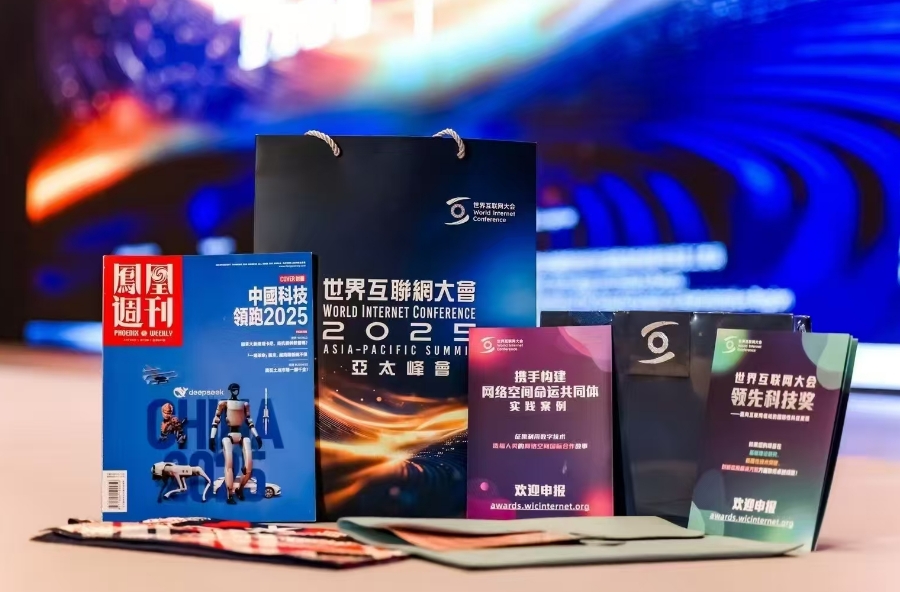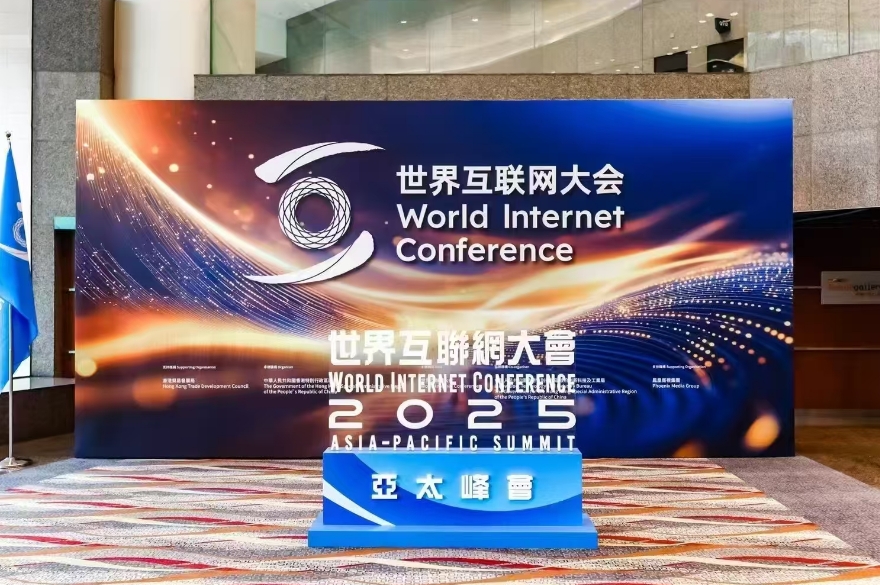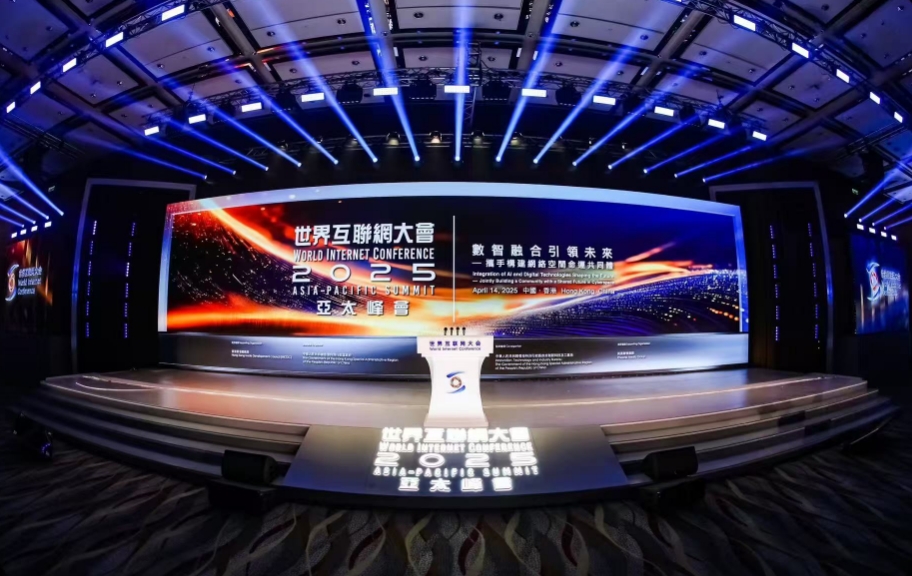With gentle sea breezes and blooming Bauhinia flowers, Hong Kong is vibrant in April.

From April 14 to 15, the World Internet Conference Asia-Pacific Summit was held at the Hong Kong Convention and Exhibition Centre. This marks the first summit in Hong Kong in the 11 years since the establishment of the World Internet Conference.

Nearly a thousand guests, including representatives from government departments, international organizations, corporations, civil society groups, and experts from over 50 countries and regions, gathered to discuss and share insights on the theme “Digital Intelligence Integration Leading the Future—Joining Hands to Build a Community of Shared Future in Cyberspace.” As a supporting institution for the conference, Phoenix Media Group provided in-depth coverage from multiple perspectives. The international event brand “Phoenix Go Glocal” focused on hot topics and engaged in discussions on new technology trends with top global experts.

This international event not only responds to the future of the digital economy in the Asia-Pacific region but also serves as a global resonance of wisdom, driven by new ideas and collective efforts.
Technological Inclusiveness and Building a Community of Shared Future in Cyberspace
With the global impact generated by DeepSeek, artificial intelligence emerged as a key topic at the summit.
The open-source nature of DeepSeek aligns with the “openness” demonstrated at this summit. In an exclusive interview with Phoenix TV, Ren Xianliang, Secretary-General of the World Internet Conference, stated, “DeepSeek is open source and benefits the global community. The development of the internet and artificial intelligence should allow more people from different countries and regions to enjoy the dividends of technology, rather than confining it to a small circle.”

“AI is not just an important technology; it is also a force reshaping the global economy,” emphasized Jin Xian, Acting Vice President and General Secretary of the Asian Infrastructure Investment Bank. He noted the need for more global cooperation in the AI field to jointly shape a better AI future.
Zhuang Rongwen, Director of the National Internet Information Office and Chairman of the World Internet Conference, remarked in his speech that the continuous breakthroughs in new technologies like artificial intelligence are profoundly impacting economic development, social progress, and the international political and economic landscape. Chinese research institutions and tech companies are consistently introducing innovative achievements, such as large AI models, providing strong momentum for development in China, the Asia-Pacific region, and globally, while also offering opportunities to promote the construction of a community of shared future in cyberspace.
Diaz, Director of the National Telecommunications and Postal Service of Nicaragua, shared the cooperation with China in emergency communication networks, technical talent training, and cybersecurity. “In our cooperation with China, we have felt the respect and assistance they provide us,” she said, emphasizing that technology should be a tool to eliminate poverty and benefit the people.
As AI became a hot topic, the “Six Little Dragons” from Hangzhou emerged as the favored enterprises of the summit. Representing startup AI tech companies, they showcased their research achievements and shared the challenges of entrepreneurship and their aspirations for the industry’s future.
Han Bicheng, CEO of Qiangnao Technology, discussed the application of AI in brain-machine interfaces, highlighting practices where disabled individuals control prosthetic hands and feet using brainwaves. Companies like Qunkong Technology and Yunsenchu Technology shared successful applications of AI in spatial intelligence and robotics for extreme scenarios.
Global Connectivity and True Multilateralism
As we enter April 2025, a new wave of tariff disputes has injected significant uncertainty into the development prospects of countries worldwide. Against this backdrop, the World Internet Conference Asia-Pacific Summit continues to advocate for global economic trade, inclusive technological development, and the construction of a “community of shared future in cyberspace.”
Wang Yong, Vice Chairman of the National Committee of the Chinese People’s Political Consultative Conference, stated in his speech that the current virtual space is turbulent, with old risks and challenges still unresolved, while new security variables continue to emerge. He proposed four suggestions: align with the trends of the times to promote common development and prosperity; focus on inclusivity to create more benefits for the people; ensure shared security to build a safe development environment; and strengthen collaborative governance to establish a sound governance order, adhering to true multilateralism.
Francis Gurry, Vice Chairman of the World Internet Conference, noted that since the digital revolution, the development of digital technology has created a rich digital world but also brought numerous challenges. It is essential to establish developmental concepts and clarify digital information elements to identify which groups, enterprises, and economies are disadvantaged in the digital landscape.
Nii Quaynor, known as the “father of the internet in Africa” and Chairman of Ghana’s Network, repeatedly emphasized the importance of internet and AI technologies for Africa’s development. He highlighted that Africa’s digital economy and internet user penetration rates are currently at an intermediate level. “Our infrastructure is relatively weak, and our technical capabilities are not high enough… Despite these challenges, we are still making continuous progress.” Quaynor believes that with ongoing improvements in infrastructure, the number of internet users in Africa will soon rise to second only to Asia.
Regional Collaboration: Enhancing the Role of the Asia-Pacific Digital Technology Exchange Hub
The Asia-Pacific region has long been a crucial growth area for the global economy, accounting for over half of the world’s GDP, with rapid internet development. However, it is equally important to acknowledge the imbalances in regional internet technology development. The organizers of the World Internet Conference Asia-Pacific Summit hope to contribute to the promotion of digital infrastructure construction, elimination of the digital divide, and strengthening of policy coordination in the Asia-Pacific region.
Looking across Asia, Hong Kong exemplifies not only its role as a “communication hub” but also its new advantages in the era of technological innovation. Zheng Yantong, Deputy Director of the Hong Kong and Macao Affairs Office of the State Council and Director of the Central Government’s Liaison Office in Hong Kong, stated in his speech that Hong Kong is a pioneer in internet development, possessing traditional advantages as an international financial, shipping, and trade center, alongside new strengths in AI research and development, innovation, talent aggregation, and industrial collaboration. Furthermore, its unique advantages in institutional innovation, bilingual and multilingual capabilities, cultural inclusiveness, and connectivity align deeply with the intrinsic logic of smooth networking and digital integration.
Chief Executive of the Hong Kong Special Administrative Region, John Lee, Addresses the Summit
In his opening speech at the summit, John Lee, Chief Executive of the Hong Kong Special Administrative Region, pointed out that the Asia-Pacific Summit is the first international summit of the World Internet Conference held outside mainland China, highlighting Hong Kong’s status as an international innovation and technology center and confirming the deep integration of Hong Kong with national development.
Lee further emphasized Hong Kong’s strong focus on artificial intelligence development. In December last year, the first phase of the Cyberport AI Supercomputing Center began operations; the SAR government has also established funding programs to assist local manufacturers in transitioning to smart manufacturing. In the upcoming fiscal year, the government plans to establish the Hong Kong AI Research Institute to lead research efforts and promote AI-based industry applications.
“Artificial intelligence is not only a transformative tool for upgrading traditional industries but also a catalyst for innovation and reshaping business models. The concept of AI+ means that AI can be seamlessly integrated into various fields, bringing unprecedented breakthroughs and creating new market opportunities,” stated Sun Dong, Secretary for Innovation, Technology and Industry of Hong Kong. He noted that hosting the World Internet Conference Asia-Pacific Summit in Hong Kong is timely, as this summit will help deepen digital cooperation in the region, accelerate the construction of Hong Kong as an international innovation and technology center, and promote the vigorous development of the digital economy in the Asia-Pacific region.
Over the past 11 years, the World Internet Conference has evolved from the sounds and lights of Wuzhen’s water town to the sparks of wisdom by Victoria Harbour. Throughout this journey, the conference has witnessed the rapid advancement of global technology and has become a strong advocate for the integration of digital intelligence and the inclusive development of advanced technology.
Technological inclusiveness, global connectivity, and regional collaboration resonate with the currents of the world and future technologies, representing Hong Kong’s strongest voice as it looks to the future.
Reporter: Gong Jing
Editor: Zhang Yixiao

David is an accomplished writer and editor who has now working in Financial Reporting 24. David has more than 2 years experience in digital news publication.
Disclaimer: The views, suggestions, and opinions expressed here are the sole responsibility of the experts. No Financial Reporting 24 journalist was involved in the writing and production of this article.

